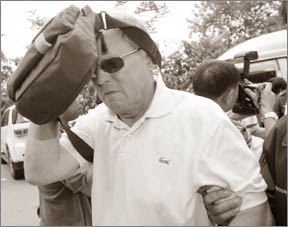The child slaves of Saudi Arabia
|

Ilkka Ylikojola of Finland arrives for press conference at the Crime
Against Child, Juvenile and Woman Suppression Division in Bangkok,
19 March 2007. Two Britons, the American and a Finnish were arrested
in Thailand’s eastern resort town of Pattaya 19 March and charged
with sexually abusing underage girls, police said. -AFP
|
On the wealthy streets of Jeddah, in Saudi Arabia, thousands of young
child-beggars, under the auspices of ruthless gangmasters, are simply
trying to survive. Many hail from countries like Yemen which, despite
bordering one of the Middle East's richest states, is a world away in
terms of economic prosperity.
These children are often sold by families who are either duped into
believing their offspring will get a better life or sometimes simply
threatened. Once in the country, they are likely to face beatings and
are sometimes even mutilated as their Dickensian masters stoop to any
low to try to improve the chances of them earning more money.
The Ministry of Social Affairs in Saudi Arabia's western province has
a unit dedicated to picking up children who are illegal in the country.
It is tasked with taking these children from the streets and then
investigating their stories. Efforts are made to try to find their
families but often no relatives are found.
In such cases, these youngsters are deported as illegal aliens back
to their country of origin. What is clear is that they are working for
others, out of education, kept in a cycle of poverty and danger.
But to bring these children in, the unit must carry out night-time
swoops to find children begging without families. When these children
are found, they are often frightened and desperate to get away from the
Saudi officials. One child found by the team during a raid, Ali, is a
typical victim of the slavery business. Initially, he attempted to
convince officials that he was in the city with his brother.
However, it soon became clear that this was not the case.
'Smuggled'
Eventually, Ali revealed that he slept under a bridge or in "any
house" he could find. He avoided using shoes, to boost his chances of
getting money.
While the details of Ali's story are sketchy, we know that Ali was
smuggled across the porous border between the Yemen and Saudi Arabia.
In 2005, the Yemeni Ministry of Social Affairs acknowledged that
about 300 children were crossing the border every month. It is not
always possible to know the entire truth about these children but what
is clear, is that they are working for others, out of education, and
kept in a cycle of poverty and danger.
Ali told officials at the shelter: "I was smuggled in, in order to
beg. I told him (the gangmaster) I don't want to beg, so he beat me up."
The boy said he ended up begging because of physical abuse involving
metal wire attacks to his back. He also said he was forced to beg all
day, but claimed that he only gave some of his earnings back to his
paymaster.
Fake story
Such is the scale of the problem that a centre to house rescued
children has been opened in Yemen at the Harad Border Crossing. That is
Ali's most likely destination.
The precise truth of his story will probably never be known. Even
officials in the shelter do not really believe the account he has given
them, citing inconsistencies with earlier interviews. Those brought to
the shelter have often been schooled to give some sort of false story
about having families in Saudi Arabia.
The children caught are almost entirely boys and although many come
from Yemen, others come from countries such as Somalia, Sudan, Chad,
Pakistan and India. Yemen has become more involved in child trafficking
since its workers were expelled from Saudi Arabia in the 1990s following
the first Gulf War.
Children were sent instead because Saudi authorities do not prosecute
children.
Meanwhile, the future for Ali is uncertain. A delegate from the
Yemeni Embassy will visit the shelter to pursue Ali's case and try to
trace his family.
In all likelihood, he will be deported back to his country of origin,
but with the trade of children continuing to rise, Saudi officials will
probably be meeting many more like him.
This World: Slave Children will be broadcast on Monday, 26 March,
2007 at 2100 BST on BBC Two.
BBC
|
